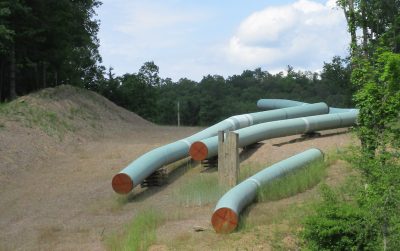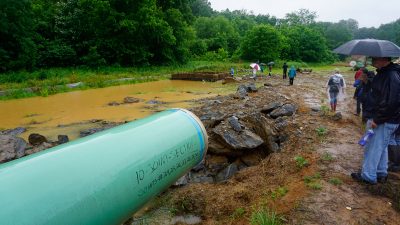 Today marks the 2nd anniversary of the timeframe that Mountain Valley Pipeline, LLC, originally said its 303-mile pipeline would be up and running, pumping gas from West Virginia through Virginia. Not only is the project two years behind schedule and only half-built, but the company has asked the Federal Energy Regulatory Commission for two more years to finish it.
Today marks the 2nd anniversary of the timeframe that Mountain Valley Pipeline, LLC, originally said its 303-mile pipeline would be up and running, pumping gas from West Virginia through Virginia. Not only is the project two years behind schedule and only half-built, but the company has asked the Federal Energy Regulatory Commission for two more years to finish it.
Today also marks the date on which the pipeline needed to have been operational to compel EQT, one its largest customers, to stay in a high-stakes contract with Equitrans Midstream, the pipeline’s developer. EQT has already made the determination that its contract with Equitrans was voided as of October 1 when the pipeline missed its deadline to be in service.
As of this moment — 10 a.m. on October 1 — the pipeline is still under a stop-work order for the entire length, issued almost a year ago by FERC. And FERC has yet to grant the 2-year extension of its Certificate of Public Convenience and Necessity, upon which all other regulatory actions depend.
But wait, there’s more ….
Notwithstanding MVP, LLC’s persistent plot line for investors that all-is-well, the project has been subject to massive enforcement fines, regulatory setbacks, legal roadblocks and a groundswell of public opposition. To date:
- The project is still missing key permits from the US Forest Service and Bureau of Land Management.
- Two of the three water-crossing permits issued by the Corps of Engineers late Friday have already been legally challenged, and it’s far from certain whether MVP can rely on them.
- More than 43,000 individuals sent comments to FERC objecting to the certificate extension.
- North Carolina regulators recently rejected a key water quality permit for the MVP Southgate, an extension of the MVP mainline, “…given the uncertain future of the MVP Mainline. North Carolinians should not be exposed to the risk of another incomplete pipeline project.”
- Despite claims by Equitrans that the pipeline is almost done, the project is still about half incomplete, and no individual section is fully complete. It still has the hardest parts to go: approximately 1,000 water crossings and the steepest sections across the Blue Ridge mountains.
With the gas industry in free fall, analysts are expressing skepticism whether the MVP will ever be completed, or if it will be cancelled like the similarly ill-conceived and unnecessary Atlantic Coast Pipeline:
- MVP’s claim that 100% of the pipeline’s capacity has been “pre-sold” under contract is misleading. In fact, EQT, a natural gas producer, not consumer, is currently contracted for almost ⅔ of the pipeline’s capacity, and the company’s CEO recently stated EQT hopes to sell off its MVP commitment.
- Last year, Con Edison, one of the partners in MVP, LLC, scaled back its investment in the MVP from 12.5 percent to 10 percent, and now says it may sell its stake.

Sections of the Mountain Valley Pipeline in central West Virginia. Photo courtesy of Mountain Valley Watch
- FERC Commissioner Richard Glick noted in a September 7 opinion: “The Southgate Project is, for all intents and purposes, an expansion of the troubled Mountain Valley pipeline. Granting it a 14% [Return On Equity] … will only encourage the overbuilding of the pipeline system at customers’ expense.”
- EQT and Equitrans are in a major dispute over the related Hammerhead pipeline project, apparently unable to agree whether that pipeline is in service, or not.
- In a lawsuit filed in August, a Pennsylvania contractor who worked on the pipeline accused MVP, LLC of refusing to pay $104 million in cost overruns that were due to project delays.
- Fitch Rating, which assigns rankings based on “the relative ability of an entity to meet financial commitments,” recently gave EQM Midstream Partners, MVP’s majority owner, a negative rating. Fitch’s action was based on the uncertainty and risk from “regulatory and environmental challenges with multiple delays and cost overruns.”
- Earlier this year, S&P Global Ratings downgraded EQM Midstream Partners credit rating (their opinion about the ability and willingness of the company to meet their financial obligations on time and in full) because it “faces major ongoing uncertainties to adverse business, financial and economic conditions.”
- The Virginia Attorney General in 2019 fined MVP, LLC more than $2 million for more than 300 water quality violations in one of the largest water-pollution enforcement actions brought in the state.
- West Virginia regulators have issued dozens of “notices-of-violation” to the company and fined it at least $266,000.
- Ranked in February 2019 as the most expensive-per-mile natural gas pipeline project in the U.S., the MVP is roughly $2 billion over budget…and counting.
In an alarming development this week, it’s reported that staff members of the Virginia Department of Health and Gov. Ralph Northam’s administration were in direct conversation with MVP lobbyists and lawyers about bringing as many as 2,000 works into the state, and that the state officials failed to require or ensure that MVP had a sufficient preparedness plan to protect both workers and community members from Covid-19. The MVP route runs through one of the areas in Virginia hardest hit by the pandemic, and which also has extremely limited health care facilities equipped to deal with Covid cases. (Blue Virginia published this information in a 2-part series, here and here.)
From the start, the proposed Mountain Valley Pipeline has been an environmental disaster, and a nightmare for the people living along the route who’ve endured having their property taken through eminent domain, contractors working from dawn-until-dusk on their land, and seeing atrocious erosion and muddy runoff in their streams and fields. MVP, LLC continues to face financial and regulatory hurdles that could ultimately lead to the project never being completed, leaving investors, landowners and lurch for an ill-conceived and unnecessary pipeline.
It’s past time to stop this dangerous boondoggle. MVP is not a done deal.
(Thanks much to the team at Sierra Club and Natural Resources Defense Council for contributing information for this content.)





Leave a Reply